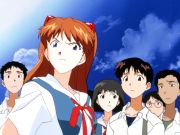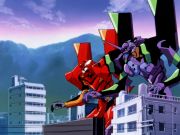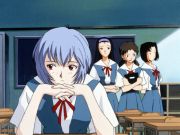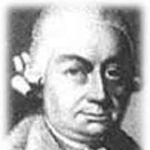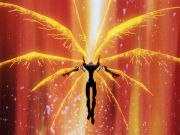

Quick Links:
Evangelion - The Day of Second Impact
When I first heard about Evangelion — The Day of Second Impact, I wasn't sure what to make of it. I knew that Geneon had released three regular soundtrack albums for the Neon Genesis Evangelion television show, as well as a few other albums related to the franchise. I guessed that this was an "image" album of some type; you know, those "music inspired by" albums that don't directly relate to the show. While it is true that this album falls outside of the standard "soundtrack" genre, it has more in common with the eX-Driver Original Songs from the Highway album than a standard image album, as this album is a collection of the more memorable musical pieces from the television show and movies. The album contains eleven tracks. Six of the tracks are various pieces of background music from the television show or one of the movies, and five are vocal themes from the same programs. The balance between the television show and the movies is almost even, with six of the tracks being from the television show, and five from the movies. Interestingly, a number of the songs with vocals are sung in English, rather than in Japanese.
I must admit that I am not the biggest Evangelion fan in the world. I saw the first DVD for the television show a few years ago when I started to really become heavily interested in anime, and I saw the Death and Rebirth movie a few months back. Neither one made a whole lot of sense, I must admit, but I am generally familiar with the overall story from the manga, which I devour as fast as I can find new volumes. Based on what I know, I feel safe in letting everyone know that Evangelion is not a happy story. While it might be happier than, say, Now and Then, Here and There, it can still get depressing. Notably, that is generally not reflected in the music on this album, with some early exceptions.
At least the first track feels like an Evangelion song, even though I find it a questionable choice to lead off the album. The first track, "Angel Attack," is a piece of background music from the TV show. This is a heavy, ponderous orchestra piece filled with dramatic tension. While I'm sure that the song did an excellent job in the television show of adding drama to a fight against one of the angels, it doesn't really act as a good setup to this album. The second track, "A Cruel Angel's Thesis," is the opening theme to the TV show, and is a pretty rockin' little song, with good use of bass and brass to drive it along. As befits an opening theme to a show such as Evangelion, the lyrics hint at some of the larger themes of the show, while not actually giving anything away.
The album then moves to "Decisive Battle," another piece of background music from the TV show. Like the first track, this one uses a full orchestra, and reflects a sense of danger and foreboding. It probably works really well within the context of the show, but placed between the opening and ending themes, it seems out of place. I can appreciate the use of battle themes in an album like this, but placing them this early in the album seems odd. The tracks just aren't flowing well into each other at this point. The fourth track is the ending theme for the television show, "Fly Me to the Moon," which seems to have absolutely nothing to do with the actual show. It is a jazzy love song, with primary musical emphasis put on the singer and the piano accompanying her. This is actually a very traditional jazz piece written by Bart Howard, and is most often associated with Frank Sinatra, who popularized it. It is much slower-paced than the previous tracks, and brings the energy level down quite a bit, which actually segues nicely into the next track, "Thanatos," another TV background piece. This track is mellower than the battle themes, however, and flows better with the surrounding tracks on the album. The music has a touch of melancholy to it, but not overpoweringly so, and it is orchestrated very well, with excellent use of strings to convey the emotions of the piece.
At this point, the music on this album moves from the television show to the movies. The sixth track is "Kanon D-dur," a string quartet piece composed by the classic German composer Johann Pachelbel, who is considered by music scholars to be the stylistic precursor of Johann Sebastian Bach, whose older brother was a student of Pachelbel's for a time. This piece is generally considered by modern audiences to be Pachelbel's most famous work, which is somewhat humorous when you consider that his sacred music is much more complex and technically demanding than the "Canon in D-major." In the Death and Rebirth movie, from which this track is taken, this is the musical piece that the Eva pilots play together. From this slow piece we move to track seven, "Soul's Refrain," which starts out slow, but then moves into more of a dance-house feel with driving bass and a fast rhythm. It also includes some mildly-creepy choir work towards the end, and it ends rather abruptly, which probably worked much better in the movie than it does on this album. This track is the main theme song from the Death and Rebirth movie.
From there we move onto another classical piece, Johann Sebastian Bach's "II Air," from Bach's third orchestral suite, arranged for strings, and used in the End of Evangelion movie. The change from the previous track to this one is quite abrupt, as the musical style of the pieces could not be more different. Where "Soul's Refrain" was hard driving, "II Air" is quite slow. It is an excellent, if somewhat melancholy, piece, but I've been a Bach fan for years, so it isn't surprising that I would find it enjoyable. Because Bach's orchestral suites are fairly common pieces of classical music, I would not be at all surprised if some of you found this track familiar.
Track nine, "Thanatos — If I Can't Be Yours," is a light hip-hop song, sung in English, hailing from the End of Evangelion movie. It is interesting because as the song progresses the background music starts to clash with the main melody, before moving back in harmony, clashing some more, and finally resolving with a final flourish. Musically, the piece is very basic, relying on bass, piano, and violins. The tenth track, "Komm, Süßer Tod" also hails from the End of Evangelion movie, and is also sung in English. This song has the distinction of having a rather nice, happy musical sound, while having some of the most depressing lyrics I have ever heard. Here is a nice example for you: "I wish that I could turn back time, 'cause now the guilt is all mine; can't live without the trust of those you love. I know we can't forget the past, you can't forget love and price; because of that, it's killing me inside." As I noted above, Evangelion is not a happy story, so this song goes very nicely with the overall feel of the property. Musically, the song is quite simple, with mild bass, piano, and strings carrying the instrumental duties, while the singer and a backing choir get main billing. It's actually quite catchy, if you don't pay attention to the lyrics.
The album ends with "Jesus bleibet meine Freude," more commonly known in English as "Jesu, Joy of Man's Desiring," another Bach number, which I'm sure everyone has heard before at some point, as this is one of Bach's most famous and popular pieces in the current day. As with the other classical pieces on this album, this one is arranged for strings. A musical composition purportedly about Jesus Christ is an interesting choice for an anime with as much Christian (if highly slanted/distorted) symbolism as Evangelion, and it must have been interesting for people to hear this during the ending of the finale of the movie, at least if they knew what it was. I think the music director has a rather "interesting" sense of humor to have used the piece this way. It is a very nice piece, but a rather odd way to end a rather odd album.
At the end, it is hard to really say what I think about this album. Many of the tracks are quite good from a musical perspective, but the album itself does not flow well. I can appreciate the way that the music moves from the television show, to the first movie, to the second movie, but perhaps a more creative way of arranging the pieces could have given the album a better overall flow. This album seems to have two primary audiences. First, if you like the show and want a soundtrack album, but can only buy one and want to cover the television show and both movies, then this is the album for you. Second, if you are a die-hard Evangelion fan who just has to have everything produced for the property, then you'll be in the market for this album, also. The rest of you should proceed at your own risk. This isn't a bad album by any means, but there are better, and more musically cohesive, ones out there.

